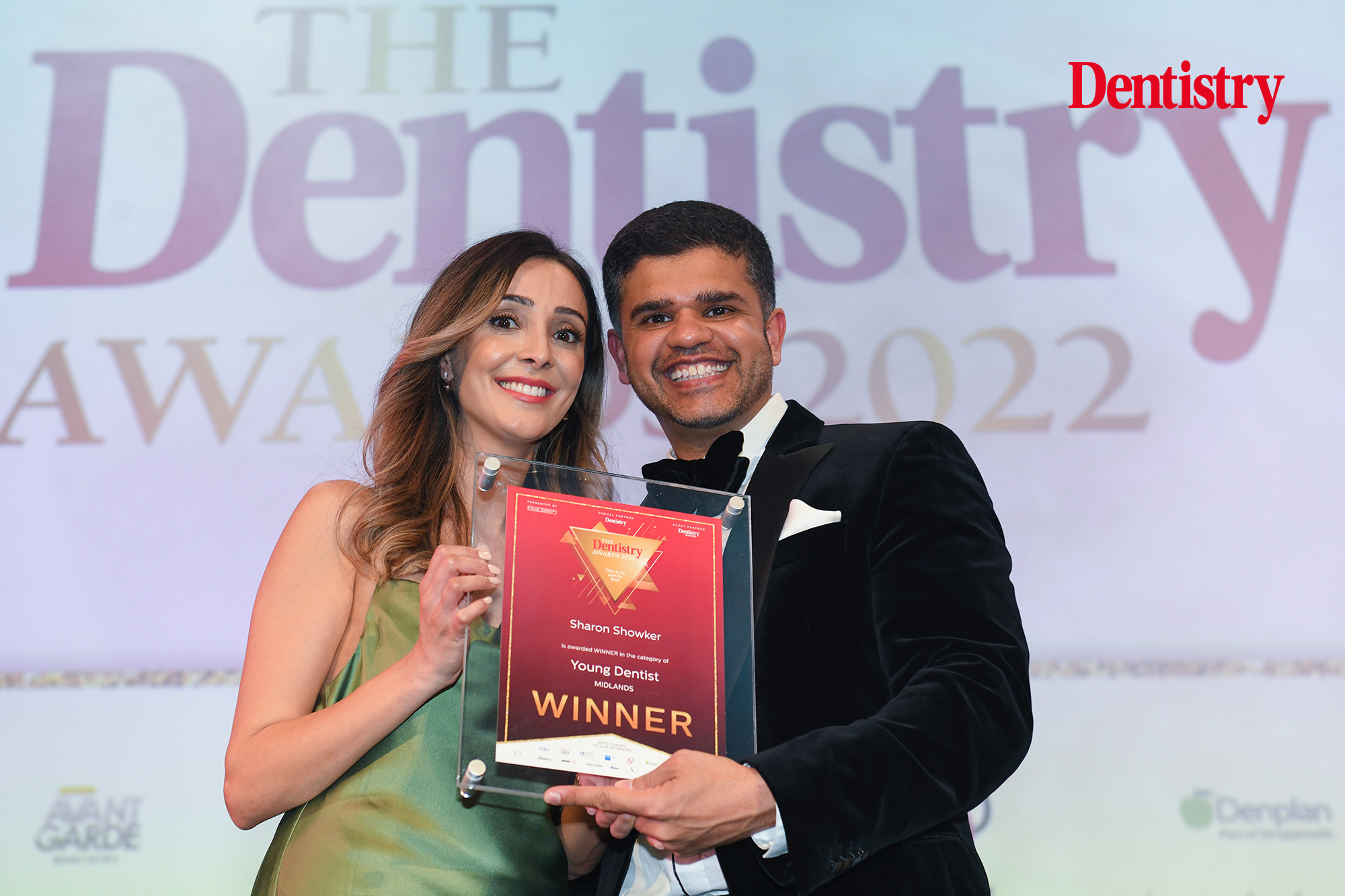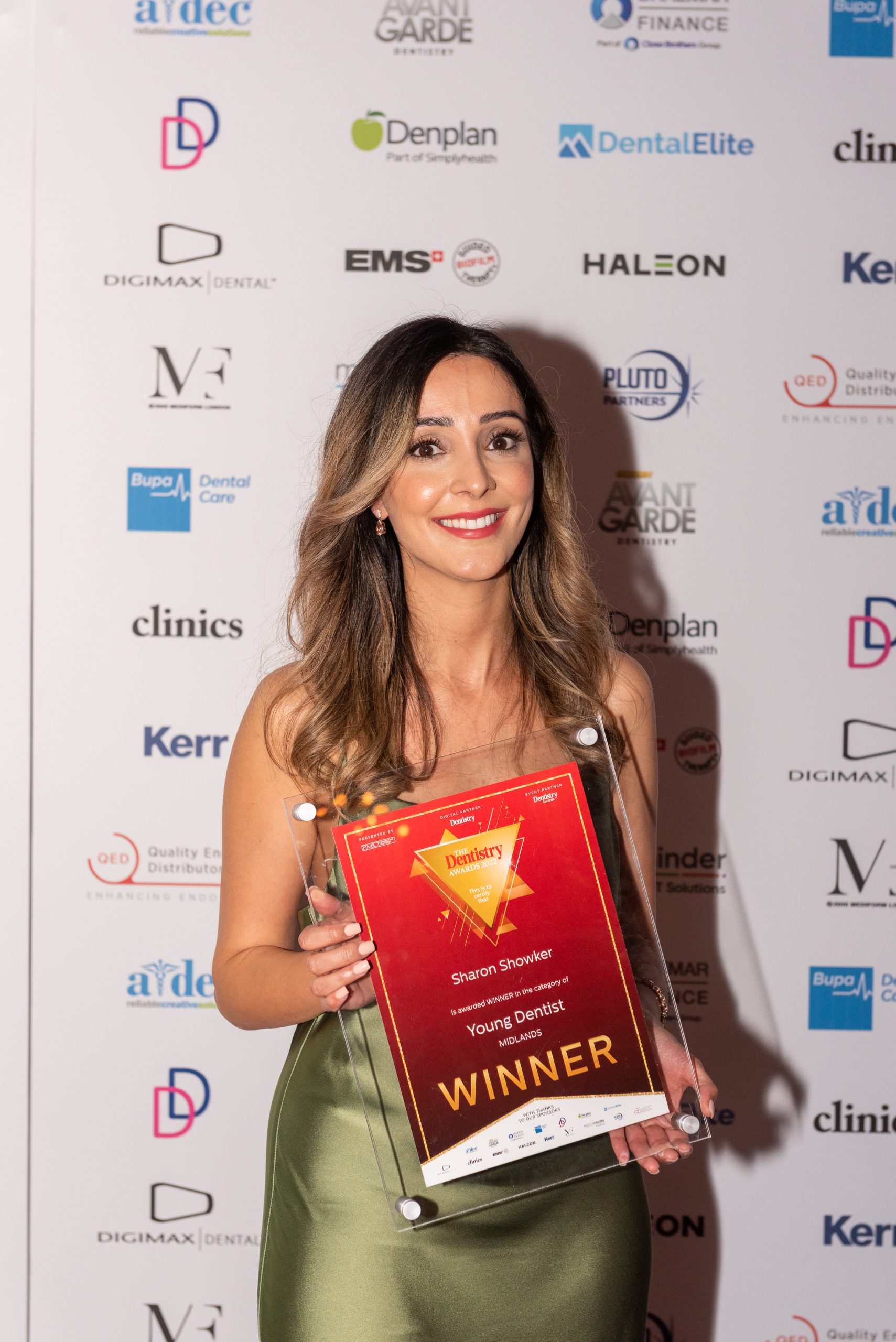
Young Dentist speaks to Sharon Showker about winning Young Dentist Midlands, and how to submit a winning entry.
Congratulations on winning Young Dentist Midlands at the 2022 Dentistry Awards! How does it feel to win?
I am honoured and grateful to receive the award for Young Dentist Midlands and the recognition it represents.
It’s taken a lot of hard work and commitment, but it still doesn’t quite feel real yet! It is by far the highlight of my career to date. It’s an honour to be recognised amongst such a talented group of colleagues.
When I first graduated, I never could have imagined that I would be receiving this award.
There are so many great dentists that have received this award who have inspired me. I hope one day I can inspire other young dentists to be the best they can be.
What advice would you give other young dentists looking to apply to the Dentistry Awards?
When compiling your entry, prepare to put in the time and effort necessary to create a strong application. This means thoroughly researching the award you’re interested in, understanding the criteria and putting together a complete and compelling application that highlights your clinical work, achievements and qualifications.
The awards are highly competitive, but keep applying, keep learning and keep pushing to be your best.
Applying for the Dentistry Awards is a fantastic opportunity to showcase your skills. Seeing other dental colleagues be recognised and seeing their work has provided me with a source of inspiration and motivation, as well as a benchmark to strive towards.
The experience I’ve gained from the process and the connections I’ve made along the way have been just as valuable as the award itself.
I knew the quality of the finalists would be incredibly high, which gave me the push to strive to set myself apart.
How did you get into dentistry?
When I had my braces removed, it was a real ‘aha’ moment for me. Having gone through such a life-changing experience, it really gave me the desire to help others.
As dentists, we play a crucial role in improving people’s oral health, which can have a significant impact on overall health and wellbeing.
Decades later – on the other side of the chair – that feeling when someone has that transformative moment in their smile makeover journey never gets old.
There’s nothing better than that moment when somebody comes to the end of a smile makeover, and I get to see the physical and emotional impact. It’s exciting and gratifying every time.
What do you think makes a good dentist?
I think good dentists are those that are on a journey of constant and never-ending improvement in all areas, from technical skills to communication and empathetic skills.
Good technical skills and attention to detail have always been important in dentistry and are the basis of our undergraduate education. However, I think a good dentist also understands that each patient has their own needs and concerns and takes a personalised approach to their care.
I believe taking the time to understand what a patient wants and having the ability to explain complex procedures in a way that patients can understand helps avoid problems down the line.
We are regularly explaining the same things to patients daily, and it can become repetitive. However, a great dentist must have patience and take the time to answer patients’ questions and address any concerns.
What advice would you give to other young dentists who are looking to progress in their careers?
Surround yourself with people who believe in you and support you – and always believe in yourself!
If you’re at the start of your career, my advice is to go on lots of courses and nurture skills. Courses also help you find mentors who can guide you when you’re back in practice.

What are your professional goals and aspirations for the next five years?
There are many dentists who have inspired me, and I wouldn’t be where I am without their support and encouragement. I’m so grateful for this, and I’d love to get involved in teaching and mentoring to help younger dentists to reach their goals.
I would also like to be more involved with community projects. Recently, I spent some time volunteering with a dental outreach programme, operating in a mobile unit, and helping homeless and vulnerable people in Birmingham.
The founder of the organisation, Dr Manjit Rai, is so inspiring. That has been one of the most rewarding experiences of my life.
What do you get up to outside of dentistry?
I go to the gym three times a week. It improves my overall productivity and posture at work, where I’m mostly sitting all day.
Since the pandemic, I’ve become a keen gardener. One day, I’d love to have an allotment and grow my own vegetables, but I don’t think I have the time to commit to that right now!
What do you think the future holds for dentistry?
A variety of factors are likely to shape the future of dentistry, including advances in technology, changes in patient needs and expectations and evolving trends in the healthcare industry.
Digital technology is already transforming dentistry, with innovations such as digital imaging, computer-aided design, and manufacturing (CAD/CAM).
As dentistry enters this new phase of digitisation, I believe in the future, there will be wider adoption of technology where it becomes an industry standard.
I think the next big things to look out for are artificial intelligence (AI), 3D printing and augmented reality.
Augmented reality technology has already become familiar through social media app filters. This is already being applied to dentistry with an overlay of virtual depictions of the improved smile before the procedure.
I think this will become more sophisticated and personalised to each individual with the ability to tailor different options before a patient even sits in the dental chair.
AI could analyse large amounts of patient data, identify patterns and trends and develop predictive models for oral health conditions.
This could help dentists to detect and treat issues earlier, and provide more personalised treatment options and probabilities of success for individual patients. AI is also already being used to help monitor patient treatment, such as during clear aligner treatment.
No doubt, more popular ways to use AI in other areas of dentistry will also be explored.
Follow Dentistry.co.uk on Instagram to keep up with all the latest dental news and trends.


